The Olympic Winter Games Beijing 2022, as the first comprehensive global sports event held as scheduled since the start of the COVID-19 pandemic, has set multiple records in Olympic history. Bringing together 2,902 athletes from 91 countries and regions vying for 109 gold medals, Beijing 2022 presents more winter sports events and generates more gold medals than any previous Games. According to the International Olympic Committee (IOC), Beijing 2022 is also "the most gender-balanced" Winter Games in history, with women accounting for a record 45 percent of the athletes. Meanwhile, the Olympic Broadcast Services (OBS) also hailed Beijing 2022’s record-breaking digital reach; according to its CEO Yiannis Exarchos, the Games are already the most viewed ever.
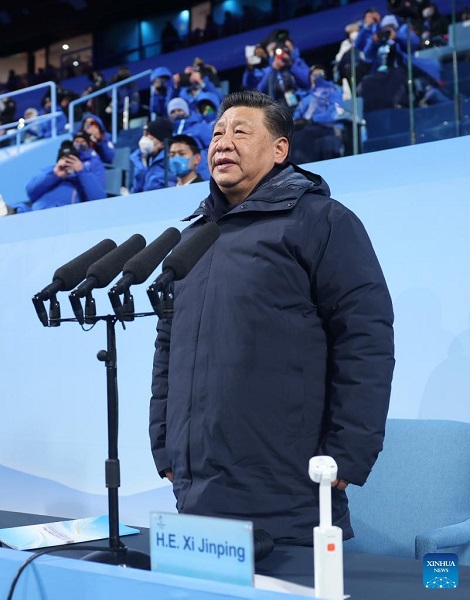
Chinese President Xi Jinping attends the opening ceremony of the 24th Olympic Winter Games and declares the Games open at the National Stadium in Beijing on February 4, 2022. (Xinhua/JuPeng)
The Olympic cauldron was lit once again in Beijing after 2008, making the ancient capital the world’s first city to host both the Summer and Winter Olympic Games. Committed to organizing green, inclusive, open, and clean Games, China has made every effort to counter the impact of COVID-19, and earnestly fulfilled its solemn pledge to the international community, Chinese President Xi Jinping said at the welcoming banquet of the Olympic Winter Games Beijing 2022.
Beijing 2022 came just in the nick of time to inspire confidence in a world that is struggling with the still raging pandemic, faltering economic recovery, and resurrection of Cold War mentality. UN Secretary-General António Guterres, during his meeting with President Xi on February 5, stressed that the world now needs a successful Winter Olympics to send a clear message that people of any country, ethnicity, and religion can rise above differences to achieve solidarity and cooperation.
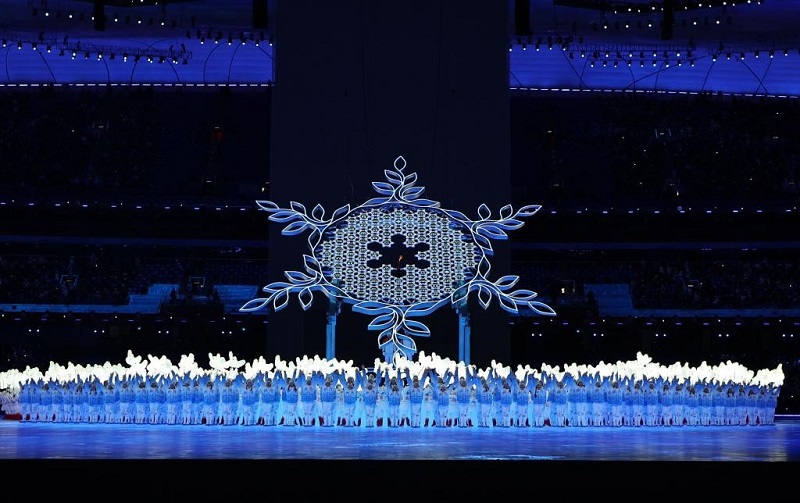
The cauldron is lit during the opening ceremony of the Beijing 2022 Olympic Winter Games at the National Stadium in Beijing on February 4, 2022. (Xinhua/Cao Can)
Honoring the Olympic Spirit
From “One World, One Dream” in 2008 to “Together for a Shared Future” in 2022, China has taken an active part in the Olympic Movement and consistently championed the Olympic spirit, President Xi stressed in his video address at the opening ceremony of the 139th IOC Session on February 3.
China has pursued the Olympic ideal with concrete actions. “By preparing for and organizing the Winter Games, we have successfully engaged 300 million Chinese on snow and ice sports. We have also promoted regional development, ecological conservation, green and innovative solutions, and the betterment of people’s lives in China, and created greater space for the development of winter sports worldwide,” Xi pointed out in his video speech. By doing its best to deliver a streamlined, safe, and splendid Games, China acts on the Olympic motto “Faster, Higher, Stronger ― Together.”
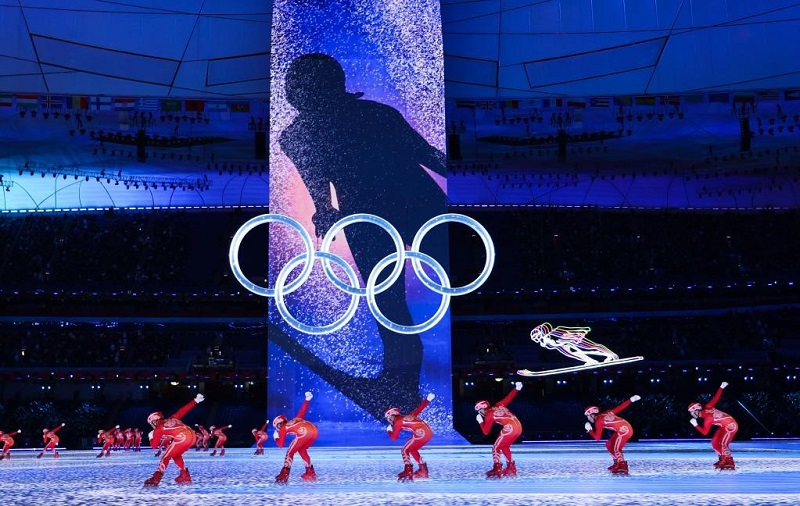
Skaters perform during the opening ceremony of the Beijing 2022 Olympic Winter Games at the National Stadium in Beijing, capital of China, Feb. 4, 2022. (Xinhua/Cao Can)
At the spectacular opening ceremony of Beijing 2022 staged at the National Stadium on the evening of February 4, 2022, President Xi announced the beginning of the Games. The day coincided with "Lichun" (the Start of Spring), the first of the 24 Chinese solar terms and an auspicious occasion. The opening ceremony was imbued with profuse traditional Chinese cultural elements. From the 24-second countdown performance with each second representing one of the 24 solar terms, to the rolling Yellow River water transforming into an ice block and then into crystal clear Olympic rings, symbolizing the blending of civilizations, and to the “Chinese Gate” implying openness and sharing and the “Chinese Window” showcasing Chinese civilization and achievements — the ceremony offered a stunning visual feast for audiences, fusing Chinese culture and Olympic spirit.
During China’s bid for Beijing 2022, President Xi stated in 2015 that hosting the Winter Games in China would promote exchanges and mutual learning between Chinese civilization and other civilizations of the world.
Chinese cultural elements have not only been showcased in the opening ceremony, but in almost every aspect of the Games, involving designs of venues, clothing, mascots, and the emblem. Beijing 2022 has become a window displaying both the splendid Chinese culture and an ancient major country’s demeanor and progress.
"It is a genuinely successful opening ceremony both aesthetically and culturally, which provides an excellent opportunity for the world to unite and make efforts towards a shared future," Benyamin Poghosyan, chairman of the Center for Political and Economic Strategic Studies in Armenia, told Xinhua days ago, stressing that despite all obstacles, by offering such a magnificent opening ceremony, China has proven its ability to unite humanity.
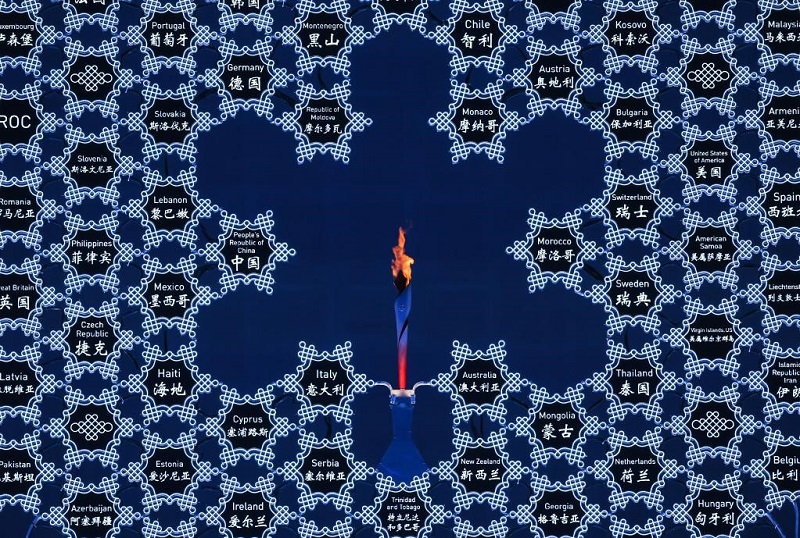
The cauldron holding the Olympic flame is a big attraction of the opening ceremony of the Beijing 2022 Olympic Winter Games at the National Stadium in Beijing. (Xinhua/Cao Can)
At the opening ceremony, as the 91 placards representing 91 participating countries and regions formed a giant snowflake, the message sent across was that the world was a community with a shared future.
The concept of “Together” championed by the Olympic Movement is needed now more than ever. During his meeting with IOC President Thomas Bach on January 25, President Xi pointed out that instead of riding separately in some 190 small boats, countries around the world should stay together in one giant vessel and sail toward a brighter future. “That is why we put forth ‘Together for a Shared Future’ as the official motto for the Beijing 2022 Games. China will make new and bigger contributions to the Olympic Movement and the building of a community with a shared future for mankind,” said President Xi.
Together for a Shared Future
More than 30 state leaders, members of royal families, and heads of international organizations were among the around 170 dignitaries from nearly 70 countries, regions, and internal organizations attending the opening ceremony in Beijing, testifying to the international community’s support for China despite some Western countries’ political boycott of Beijing 2022, as well as their aspiration for solidarity in the trying times.
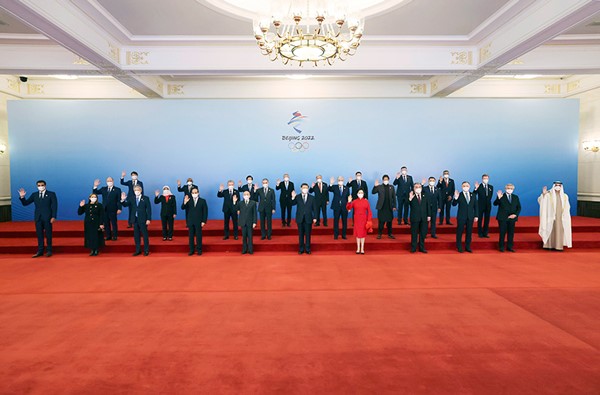
President Xi Jinping and his wife Peng Liyuan pose for a group photo with distinguished guests from around the world who attended the opening ceremony of the Beijing 2022 Olympic Winter Games, at the Great Hall of the People in Beijing on February 5, 2022. [Photo/Xinhua]
In his toast at the Welcoming Banquet of Beijing 2022, President Xi said, “We shall promote the spirit of the Olympic Movement and meet the common challenges facing the international community through solidarity.” He then pointed out that the only way for all countries to address the various challenges effectively is to strengthen solidarity and cooperation and work together for a shared future.
The Olympic Movement aims to achieve well-rounded human development Xi further observed. “We need to follow the trend of the times, stay true to humanity’s common values of peace, development, equity, justice, democracy and freedom, promote exchanges and mutual learning between civilizations, and work together to build a community with a shared future for mankind,” he said.
In his meeting with UN Secretary-General António Guterres in Beijing on January 5, President Xi noted three important things in the world that deserve serious attention: fighting the pandemic with solidarity, boosting development, and promoting democracy. Having honored its commitment to providing two billion doses of vaccines to the world in 2021, China will ramp up assistance to other developing countries in pandemic response, fully supporting the UN target of 70 percent COVID vaccination coverage by mid-2022, according to Xi. Noting that the Global Development Initiative he proposed last September is highly compatible with the UN 2030 Agenda for Sustainable Development, Xi indicated that the initiative is meant to promote a more robust, greener, and more balanced global development. With regards to democracy, Xi pointed out that no single system should be regarded as the only model to follow, nor is there a single development model that fits all. Every country has the right to choose a path that suits its national realities and meets its people’s needs.
President Xi stressed that faced with various pressing global challenges, humanity can have a better future only by strengthening solidarity and cooperation and boarding the “Noah’s Ark” of the new era together.
In the flurry of high-level meetings between President Xi and foreign dignitaries in early February, development, solidary, and mutual respect of each other’s development paths were the lasting themes. During the meetings, heads of state from developing countries unanimously expressed their gratitude to China for its valuable assistance in helping them fight the COVID-19 pandemic, including establishing Central Asia’s first vaccine production center in Uzbekistan and cooperating with Egypt to establish the first joint production line for the COVID-19 vaccine in Africa. Foreign dignitaries also highlighted the important role of the Belt and Road Initiative (BRI) in boosting regional and even global development and indicated their intention to pursue high-quality cooperation on Belt and Road.. Meanwhile, mutual respect underpins all these multilateral and bilateral cooperation.
“We need to uphold mutual respect, equality, dialogue, and consultation, strive to bridge differences and eliminate conflict, and work together for a world of durable peace," Xi indicated in his toast at the welcoming banquet on February 5.